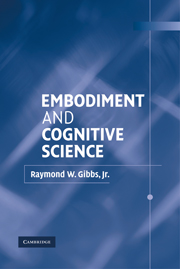Summary
Bodily experiences matter greatly in mental life. No longer is cognition divorced from considerations of the body and our phenomenological experiences of our bodies, because mind and body are deeply intertwined. The previous chapters describe the mass of empirical evidence in favor of an embodied view of thought and language. This work is representative of a second wave in the history of cognitive science that dramatically differs from the traditional view of mind as purely symbolic, computational, and disembodied. Although there are alternative ways of explaining aspects of some of this evidence, the collective weight of this work is very impressive in suggesting a unified view of mind and body.
Most discussions of embodiment in cognitive science focus exclusively on particular topics, such as the two visual systems (Chapter 3) or embodied grounding for metaphor (Chapters 4 and 6) debates. Scholars then draw general conclusions about the possibility of embodied cognition from consideration of these specific research areas. One motivation for this book was to provide a fuller picture of embodiment that cuts across the many areas of cognitive science research, including perception/action, concepts, mental imagery, memory, language, development, consciousness, and so on. I have aimed to more completely represent various disciplinary and subdisciplinary approaches to embodied cognition than is typically done in discussions of the mind-body problem. This broad sweep of the empirical literature makes it difficult to offer a single, explicit model that best characterizes the precise ways in which bodily experience shapes each aspect of perception, cognition, and language.
- Type
- Chapter
- Information
- Embodiment and Cognitive Science , pp. 275 - 282Publisher: Cambridge University PressPrint publication year: 2005



